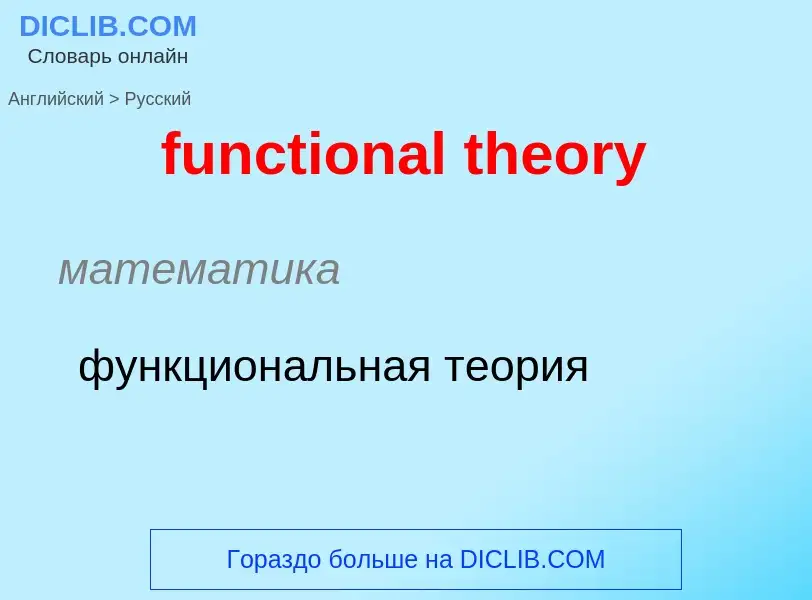Μετάφραση και ανάλυση λέξεων από την τεχνητή νοημοσύνη ChatGPT
Σε αυτήν τη σελίδα μπορείτε να λάβετε μια λεπτομερή ανάλυση μιας λέξης ή μιας φράσης, η οποία δημιουργήθηκε χρησιμοποιώντας το ChatGPT, την καλύτερη τεχνολογία τεχνητής νοημοσύνης μέχρι σήμερα:
- πώς χρησιμοποιείται η λέξη
- συχνότητα χρήσης
- χρησιμοποιείται πιο συχνά στον προφορικό ή γραπτό λόγο
- επιλογές μετάφρασης λέξεων
- παραδείγματα χρήσης (πολλές φράσεις με μετάφραση)
- ετυμολογία
functional theory - translation to ρωσικά
математика
функциональная теория
общая лексика
функциональная проба
общая лексика
эксплуатационные испытания
Ορισμός
.
Βικιπαίδεια

Functional linguistics is an approach to the study of language characterized by taking systematically into account the speaker's and the hearer's side, and the communicative needs of the speaker and of the given language community.: 5–6 Linguistic functionalism spawned in the 1920s to 1930s from Ferdinand de Saussure's systematic structuralist approach to language (1916).
Functionalism sees functionality of language and its elements to be the key to understanding linguistic processes and structures. Functional theories of language propose that since language is fundamentally a tool, it is reasonable to assume that its structures are best analyzed and understood with reference to the functions they carry out. These include the tasks of conveying meaning and contextual information.
Functional theories of grammar belong to structural and, broadly, humanistic linguistics, considering language as being created by the community, and linguistics as relating to systems theory. Functional theories take into account the context where linguistic elements are used and study the way they are instrumentally useful or functional in the given environment. This means that pragmatics is given an explanatory role, along with semantics. The formal relations between linguistic elements are assumed to be functionally-motivated. Functionalism is sometimes contrasted with formalism, but this does not exclude functional theories from creating grammatical descriptions that are generative in the sense of formulating rules that distinguish grammatical or well-formed elements from ungrammatical elements.
Simon Dik characterizes the functional approach as follows:
In the functional paradigm a language is in the first place conceptualized as an instrument of social interaction among human beings, used with the intention of establishing communicative relationships. Within this paradigm one attempts to reveal the instrumentality of language with respect to what people do and achieve with it in social interaction. A natural language, in other words, is seen as an integrated part of the communicative competence of the natural language user. (2, p. 3)
Functional theories of grammar can be divided on the basis of geographical origin or base (though it simplifies many aspects): European functionalist theories include Functional (discourse) grammar and Systemic functional grammar (among others), while American functionalist theories include Role and reference grammar and West Coast functionalism. Since the 1970s, studies by American functional linguists in languages other than English from Asia, Africa, Australia and the Americas (like Mandarin Chinese and Japanese), led to insights about the interaction of form and function, and the discovery of functional motivations for grammatical phenomena, which apply also to the English language.


